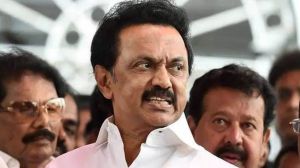145;We shouldn146;t be Americanised146;
Greg Dyke, Director-General, BBC, addressed a journalism symposium at the University of London8217;s Goldsmiths College, where he made some...

Greg Dyke, Director-General, BBC, addressed a journalism symposium at the University of London8217;s Goldsmiths College, where he made some scathing remarks about the way American electronic media covered the Iraq War. Excerpts from his speech:
The war in Iraq was described by some as the first media war. I8217;m not sure that8217;s actually true. I8217;m old enough to remember the same thing being said about Vietnam nearly 40 years ago and about virtually every other war since. How wars are reported by the electronic media largely depends on two factors, the latest technology available combined with the access that journalists can get. What was undoubtedly true in Iraq was that there was more media and a great deal more coverage than we8217;ve seen before.
You only had to look at the media centre in Qatar to see that the Pentagon had a media strategy every bit as sophisticated as their military one. Embedded correspondents may have given us better pictures and immediate insight of the battles but how much physical risk for our journalists and crews is acceptable in return for great pictures and commentary? And how do we ensure their reports are in the proper context; how can we guard against 8216;8216;embeds8217;8217; being seen as 8216;8216;in bed8217;8217; with their hosts?
Similarly, 24-hour news channels undoubtedly provided more choice for viewers.But should we worry that fierce competition to be first with the news on live television inevitably leads to editorial mistakes being broadcast? And of course the internet is an unlimited source of information but much of it is unattributed and ultimately unreliable.
With the country profoundly split over the war, we always knew there would be flak from every side and that our impartiality would be called into question. It was Huw Wheldon, the BBC8217;s former Director of Television, who said in his Richard Dimbleby lecture in 1976 that a Britain divided puts the BBC on the rack. And so it turned out to be. The BBC was accused on one hand of favouring the Bush-Blair position and on the other of being soft on Saddam. We were accused of abandoning impartiality and of sticking too rigorously to it.
Now the BBC8217;s absolute commitment to independence and impartiality is a relatively recent phenomenon. It was the Suez crisis of 1956 which helped establish these principles. The Prime Minister of the day, Sir Anthony Eden, asked the BBC for time on radio and television to explain why the French and British had invaded Egypt and taken control of the Suez Canal. The following day the leader of the opposition, Hugh Gaitskell, asked for airtime to explain why he was against the war and was given it. Today we view this even-handed approach as standard practice. But back then it brought the accusation from Eden that the BBC was betraying the nation at a time of crisis. As far as I know this was the first time government and the BBC seriously clashed over war, but it was certainly not the last.
In times of war, British governments of every persuasion have sought to use the media to manage public opinion. We saw some of this in David Blunkett8217;s attack on the media for giving too much credence to claims from the Iraqi regime; and again in Downing Street8217;s attempts to rubbish Andrew Gilligan8217;s reports on the plight of Iraqis as looters ran amok in Baghdad.
We also saw criticism from the Government over the BBC8217;s decision to keep our team in Baghdad throughout the war, the suggestion being that Rageh Omaar and others were restricted as to what they could broadcast. While it was true they did have minders who occasionally restricted their movements 8212; something we constantly said on air 8212; they did not interfere with what was being broadcast. In fact, the ineffectiveness of the minders was illustrated when Rageh8217;s minder asked Rageh if he could take the following day off so he could spend it with his family.
I8217;m not sure how many of you saw David Dimbleby8217;s interview with Donald Rumsfeld shortly before the start of the war. It was a courteous yet tough interview but certainly no tougher than anything British politicians expect on Today or Newsnight. Rumsfeld was not used to this kind of approach and his people told us afterwards they were shocked by the persistence of the interviewer. When excerpts were played in the States, many commentators agreed that American interviewers wouldn8217;t have taken such a robust approach. The aim certainly wasn8217;t to win some intellectual battle of wills or to trip Rumsfeld up. It was all about testing his arguments and not letting him gloss over difficult issues.
On American television today politicians don8217;t face that sort of interrogation. For the health of our democracy, it8217;s vital we don8217;t follow the path of many American networks and lose the will to do this.
What is surprising to many is the growing demand for BBC services in America 8212; a country with countless domestic sources of news on television and radio. In the US, the BBC World Service is achieving its highest audiences ever with nearly four million listeners a week. One-in-four opinion-formers in New York, Washington and Boston are regular listeners.
What we have found since September 11th is an increasing demand for the BBC8217;s news output in the US. During the war we were literally getting hundreds of e-mails from people in the United States saying 8216;8216;thank you8217;8217; for trying to explain events. Thank you for being impartial.
As broadcast journalists in the UK we are still surprised when we see some US news broadcasts and some of the attitudes the US networks have to covering the war.
When we read that some senior network executives say that their coverage should be influenced by what they see as their 8216;8216;patriotic duty8217;8217; we are surprised. When last year Voice of America pulled an interview they had conducted with Taliban leader Mullah Omar because of pressure from the Department of State we were also surprised. We are genuinely shocked when we discover that the largest radio group in the US was using its airwaves to organise pro-war rallies. We are even more shocked to discover that the same group wants to become a big player in radio in the UK when it is deregulated later this year.
In the area of impartiality as in many other areas we must ensure that we don8217;t become Americanised. We are still surprised when we see Fox News with such a committed political position and we are surprised when we see those in government get such a relatively easy ride from television interviewers.
I think compared to the US we see impartiality as giving a range of views, including those critical of our own Government8217;s position. I think in the US particularly since September 11 that would be seen as unpatriotic. Maybe it was always like this and the requirements of impartiality on broadcasters in the UK were always different to those in the USA, but that8217;s not how I remember it. Personally I was shocked while in the US by how unquestioning the broadcast news media was during this war.
So why has this happened? One theory I heard expressed in the US rang true with me. The argument goes like this. American television is now so fragmented there are no 800 pound gorillas around as there was when CBS, ABC and NBC dominated the American television news media. As a result many of the large TV news organisations in the US are no longer profitable or confident of their future. The effect of this fragmentation is to make government, the White House and the Pentagon, all-powerful with no news operation strong enough or brave enough to stand up against it.
This is particularly so since 9/11 when many US networks wrapped themselves in the American flag and swapped impartiality for patriotism. But what8217;s becoming clear is that those networks may have misjudged some of their audience. Far from wanting a narrow, pro-American agenda, there is a real appetite in the US for the BBC8217;s balanced, objective approach 8212; the kind of journalism which one US journalist said was refreshing for its 8216;8216;zero concern about looking unpatriotic8217;8217;.
Commercial pressures may tempt others to follow the Fox News formula of gung-ho patriotism but for the BBC this would be a terrible mistake. If over time we lost the trust of our audiences there is no point in the BBC. If Iraq proved anything, it was that the BBC cannot afford to mix patriotism and journalism. This is happening in the US and if it continues will undermine the credibility of the US electronic news media.
Courtesy: BBC
- 01
- 02
- 03
- 04
- 05































